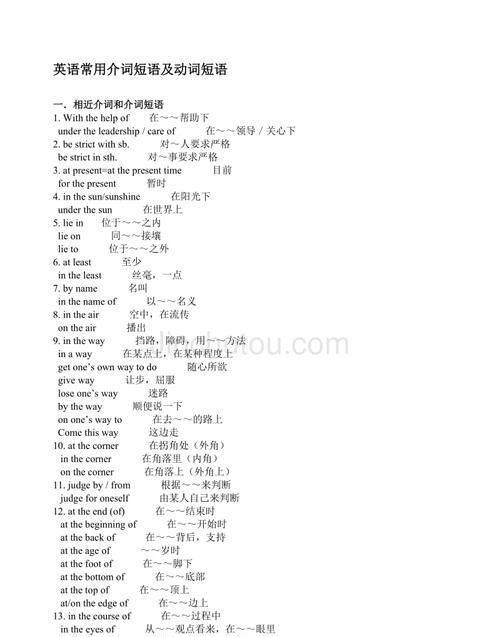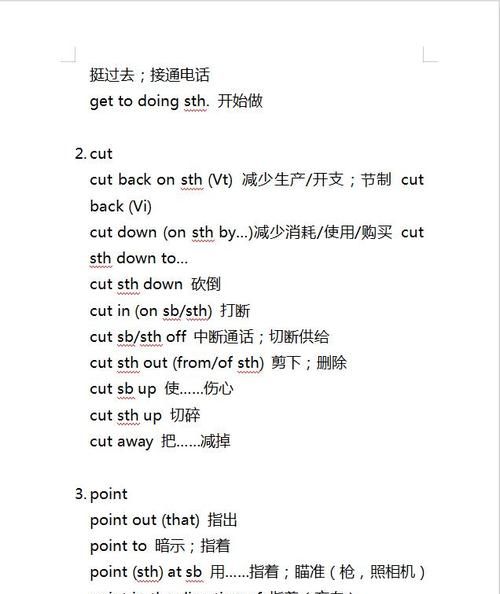本文目录
高中英语语法填空介词有哪些
高中英语语法:介词的分类
介词又叫前置词,是一种虚词。

介词分为三种,一种是简单介词,如 at, in, on, beside, to , for 等;另一种是短语介词,即由两个以上的词组组成的短语,in front of, because of, out of, instead 如 of 等;还有一种二重介词,如 until after, from behind 等。
(一) 介词的句法功能
介词不能独立在句中做成份,介词后必须与名词、代词、或动名词构成介词短语在句中充当 一个成份,表示人、物、事件等与其它人、
物、事件等之间的关系。
1、 作定语: The book on the table is mine.
2、 作状语: have breakfast at seven. We (表时间)They were late for meeting because of the heavy ; rain.(表原因) ;They started the machine by pressing the button.(表方法)
3、 作表语: My dictionary is in the bag.
4、 作宾语补足语: I found him in the office.
(二) 1.表示时间的介词
(1) in表示“在某一时间段”或“在某一时候”,如用在月、季、年份、时代、世纪等时间名词的前面,或用来泛指一天的某一段时间。in也可以指“在……之后”,表示从说话起的若干时间内。
如: in July/summer/2000/ancient times
The bus will be here in ten minutes.
(2) on表示“在特定的某一天”,也可用于带有修饰语的一天的某个时间段之前。如:on Saturday, on Saturday morning, on the morning of August 1st
(3) at表示“在某一时间点”,或用来表示不确定的时间和短期的假日、时节等。
如:at six o'clock, at Easter
(4) over, through (out)两者均指“经过的全部时间”。
如:Stay over the Christmas.
(5) for与since:for表示动作或状态延续的全部时间长度,为“长达……”之意;since用于指从过去特定的某个时刻到说话时为止的一段时间;含有since时间短语的句子要用完成时,但含有for时间短语的句子不一定要用完成时。
如:I have been there for six years.
We have not seen each other since 1993.
(6) during指“在……时期/时间内”,必须接表示一段时间的词或词组作宾语。
如:She was ill for a week, and during that week she ate little.
2.表示地点的介词
(1) above, below,over, under,on, on top of, beneath, underneath: above和below分别表示“高于”和“低于”的意思,不一定指垂直方向上的上下;over和under分别表示垂直方向上的'上下或高低;on/on top of和beneath/underneath表示“和表面相接触”意义上的上下。以上三组介词互为反义词。
如:The temple stands on top of the hill.
The pen is beneath the book.
There is a lamp on the desk.
(2) at, on, in:at指小地点或集会场合;on表示线或面上的位置;in表示在立体、区域或环境内,特别是那些较大,能够容纳相应事物的环境。
如:He works at Peking University.
Your radio is on the desk.
He's sitting in the sun.
(3) between与among:between用来说明“在……两者之间”或“三个以上人或事物中的每两者之间的相互关系”;among用来说明“在……三者以上之间”的相互关系;among可以用来表示没有确定数目的物体之间的相互关系。
如:There is a small river between the two villages.
The book is the best among these modern novels.
The relations between various countries are very important.
3.表示原因的介词
(1) for常常表示褒贬、奖惩的原因或心理原因。
如:They will reward you for your help.
(2) from和out of常常表示动机或原因;through表示消极或间接的原因。
如:He feels weak from lack of sleep.
He broke down through overwork.
4.表示目的的介词
for和to都可以引导目的地。for表示拟定的接收人或目的,for跟在含有出发或开始意义的动词后,如:leave, set out, start, depart, sail等;to表示实际的接收人或目的,to跟在含有方向性的动词后。
如:go, come, run, walk, move, fly, drive, ride等。
如:We have left for Hong Kong.
He flew to America via Hong Kong.
5.表示“关于……”的介词
一般about用于比较随便的谈话或非正式的文体;on用于正式的讲话、著作或报告中;of用于动词talk, read, know, hear等的后面。
如:What are you talking about?in terms of natural resources
6.表示原料的介词
of和out of表示制成品的材料仍保持原材料的性质;from表示制成品已失去了原材料的性质。
如:His house was built of brick.
He made these toys out of old cigar-boxes.
Steel is made from iron.
7.表示价格的介词
at和for都可表示价格,at仅表示价格;for还表示“交换”。
如:Eggs are sold at 95 cents a dozen here.
I bought it for five pounds.
;高中英语介词知识点归纳
介词的英语全称为“preposition”是由“前缀pre-(在……前部)+position(位置)”构成的,所以又叫前置词。一般放在名词、代词或动名词的前面。接下来我给大家分享关于高中英语介词知识,希望对大家有所帮助!
高中英语介词知识1
表时间的介词:about, around, before, by, at, after, in, on, between, during, for, from, since, till, until, within等。
1.表示时间先后的before,after和in。
before表示某一时刻之前和after表示某一时刻之后。in一般表示“从现在或说话时刻算起某一段时间之后”,用于将来时。after则表示以过去为起点的某一段时间之后,用于过去时。“in+时间段"也可作”在……之内"解。
He will be back in a few days. 他几天之后就回来。
He left on Monday and returned after three days. 他星期一走的,三天后回来的。
It's difficult to draw a horse well in half an hour.半小时之内画好一匹马是困难的。
2.表示"时间延续"的for, from...to
for表示动作或状态延续的时间长度,谓语动词必须是延续性的。而from...to...表示“从……到……”。
We have studied English for three years. 我们学英语已三年了。
My family lived in Beijing from 1996 to 1999.我家从1996年到1999年住在北京。
3.表示"时限"的介词since, from, by, until(till)
since表示动作的起始点,其意是 "从……以来 ",常与完成时态连用。
from表示时间的起始点,其意是"从",常和一般过去时连用。
until(prep. & conj.)意为"直到……为止"。
by (Prep.) 表示"到……为止"、"不迟于……"的意思。与be动词连用时多用于一般式;与行为动词连用时,多用于完成式。侧重于某动作将在将来或将来某一刻之前发生。
Your son will be all right by supper time. 你儿子到晚饭前就会好的。
I have lived in Beijing since 1996. 自1996年以来我就居住在北京。
From then on I began to learn English. 从那时起我就开始学英语了。
Let's wait until the rain stops. 让我们等到雨停。
He didn't go home until he had finished his homework.(用于否定句) 他直到完成他的家庭作业才回家。
注意:
(1)用在肯定句中,主要动词一般是延续性的,表示这个动词的动作一直延续到till(until)所表示的时间为止。英汉互译时,语序基本一致。
(2)用在否定句中,主要动词一般是终止性的,表示这个动词的动作直到 till(until)所表示的时间才发生。译为“(直)到时……才”。
We won't go until we get it back again. 直到我们再找回来才能走。
They travel until they come to a wild part of the forest. 他们在森林中行进,遇到一块荒地就停下来。
till(prep.& conj)和until的用法基本一样,可 以互换。放在句首一般用until不用till。在口语中,英国用till,美国多用until。
You'd better stay in bed till tomorrow. 你最好呆在床上直到明天为止。
注意:not until用在 句子 开头时主谓要倒装(在主句中进行倒装)。
Not until noon did it stop raining. 直到中午雨才停。
not...until...的强调句型为:It is/was not until...that...
It was not until he finished his homework that he went to bed.
直到完成作业,他才去睡觉。
4.表示“时间”的介词at,in和on。
at多用于钟点时刻前,所表时间大多比较短暂。at还可用于习惯表达法。例如:at breakfast/lunch/supper/dinner等。
in常用于上午、下午、晚上及表示季节、月份、年份等名词前,所指时间可长可短的时间段。on用于特殊的日期或某日的上午、下午或晚上等。试比较:
They'll have a meeting at nine in the morning. 他们将在上午九点钟开会。
Do you often do some washing on Sunday? 你常在星期天洗衣服吗?
高中英语介词知识2
表地点的介词:about, at, in, on, over, through, across, along, around, before, between, beyond, by, down, to, toward, under, up, within, near等。
1. at,on和in。
at一般是指比较小的地点和某种活动场所,或把一个地方看作一个点(不涉及大小)。
如:at the school gate, at the second crossing, at the bus stop, at the top of the paper, at the cinema, at 103 Wall Street, at the traffic lights。
on表示某东西在一个平面上(包括竖着的平面)。或某东西接触或接近一条线或类似一条线的东西(如河流、道路、边界等)如:
on the floor/ground/table/chair, on the wall, on the moon, on my head, on page seven,on a small river, on the road,on my way to school。
in 要表示在某一区域或某一立体空间。如:
in a country/city/town/village/garden/park/zoo,in the room/house/building/box, in the sky, in the sea, in the sun, in the middle of the days
2.above; over; on。
On/beneath和over/under都表示在某一物体上。但前者强调两物相接触,而后者强调覆盖这一物体。 over表示在某人或某物的正上方, 反义词 是under。above表示位置高于某人或某物,但不一定是正上方,反义词 below。below和above都可用来表示高于(higher than)。如果要表示覆盖或越过时,则用over。指数量时,我们一般用over(=more than)表示超过;但如果指上下垂直的度量及海拔高度时,要用above。
There's a picture on the wall. 墙上有一幅画。
A wide and busy road which was built like a bridge over another road fell onto the one below/ above.一座立交桥上部宽阔而车辆川流不息的马路坍塌至桥下的路上。
The water came up over/above our knees. 水已涨至我们膝盖之上。
The temperature will stay above zero in the day-time. 白天温度将保持在零度以上。
3.表示"里外"的介词in/out of,inside/outside。
表示静止的位置:in和out of相对应;表示动态时,into和out of相对应。inside,outside可以表示静止的位置,意为"在里/外面",也可表示"到里/外面"。
He is in the classroom. 他在教室里。
They walked into the garden. 他们走进花园 。
They walked out of the garden. 他们走出花园 。
He was standing outside/inside the door. 他正站在门的外面/里面。
4.表示"在……旁边"的介词by,beside。
by和beside同义,但by比beside常用。
One day a little monkey was playing in a tall tree by the river.
一天,一只小猴子在河边的一棵大树上玩。
Is there a big tree beside the house? 在房子旁有棵大树吗?
5.表示"在……中间"的介词词组in the centre of和in the middle of。
in the centre of:表示"中心"、"中央"的意思,指某种有确定边缘或形状的东西的中心点。除可指圆、球体或方形的中心外,还可以用于借喻,表示重要活动或事物的中心。
in the middle of:在表示"中间"的意思时,指跟两边或各边,两端或各端等距离的部分,还可以指时间方面的"中间"或表示程度的"中间"。
There was a terrible big fire last year in the centre of the city.
去年,市中心发生了一场可怕的大火。
I am in the middle of the great forest in South America.
我现在是在南美洲这个大森林的中部。
6.表示"沿着"的介词up,down,along。
up表示"沿着而上";down表示"沿着而下",另外,进城用up;出城用down。along表示"沿着",即从一端到另一端。
The boy jumped quickly up the tree. 男孩很快地爬上了树。
We went down the hill before sunset. 我们在日落之前下了山。
We walked along the river. 我们沿着河走。
7.表示"前、后"的介词before,in front of,in the front of。
在现代英语中,我们一般不用before这个介词来表示地点,而用in front of。
There is a car parked right in front of our gate, and we can't get out!
一辆小汽车正好停在我丫山门口,我们都出不去了。
在以下几种情况下,也可用来指地点:
(1)谈到次序的排列(如名单等):
Your name comes before mine. 你的名字在我前头。
(2)表示"在(某重要人物)面前":
I came up before the magistrates for dangerous driving last week.
上星期我因开车冒险而被法院传坏,
(3)用于right my eyes,before my very eyes(在我面前公开地)等词组中。
in front of表示"在(某一物体)前面",而in the front of表示"在……范围内的前部"。
He likes sitting in the front of the car. 他坐车总喜欢坐在前面。
8.表示"方位"的介词in,to,on。
in表示在某一地域之内的某方位(属于该范围);to表示在某一地域地区之外的某方位(不属于该范围);on表示与某地相邻的关系。这三个词表达位置关系恰似数学中圆的"包含(in)、相离(to),相切(on)关系"。
Taiwan is in the southeast of China. 台湾位于申国东南部。
England lies to the west of France. 英国位于法国的西面。
Hunan is on the east of Guizhou. 湖南在贵州的东面。
高中英语介词知识3
表手段的介词:by, with, in
三者均可表示"用"、"以"的意思,但用法不同。
by后常接动名词,表示以某种 方法 做某事;in后接名词,表示以某种工具或某物做某事;除用来与way构成in this/that/a...way表示用方法外,一般多与一些抽象化了的名词搭配,表示用某种方式、语言、风格等。
Learn to swim by swimming. 在 游泳 中学习游泳。
True friendship can not be bought with money. 真正的友谊是无法用金钱买到的。
You shouldn't have treated the matter in the wrong way.
你不该用错误的方式来对待这件事。
An English teacher should try to teach in English. 英语教师应尽量用英语教学。
It's impolite to write a letter in red. 用红笔写信是不礼貌的。
高中英语介词知识4
表原因的介词:for, from, of, with等。
1.at, for, with
三个词均可组成介词 短语 ,表示行为或状态原因、动机或理由。at常于表示感情色彩的动词形容词或过去分词搭配,后接表示具体事物的名词。for和with后接表示感情的抽象名词,其中with侧重于随着心理变化而发生的感情变化。如:
I was angry at what he said.
He was very surprised at the news.
His face turned red with anger.
We bought this house with a much higher price than others just for its convenience.
我们买下这幢房子花的钱比 其它 房屋要贵得多,就是图的方便。
2. because of, due to, thanks to
because of通常位于句首或句尾,作状语;due to通常作表语;thanks to多用于句首。
He eats because of greed, not hunger.他不是因为饿了,而是因为贪嘴才吃的。
Our thanks are due to him. 我们要感谢他。
Thanks to John , we won the game. 多亏约翰,我们才赢了这场比赛。
高中英语介词知识5
表比较的介词:as, like, over, above等。
两者都可 以表示"像……"as作连词,引导比较状语从句;从句中的动词或整个谓语部分往往可以省略。as和like都可作介词,译为"像……一样",但有区别:as侧重同一性,强调属同一类或完全相似;like侧重于比较,是比喻,并不意味着同一类或完全相似。
Then I made faces jumped like a monkey.接着我做鬼脸,并像猴子一样跳来跳去。
She spoke of me as her dearest friend.她谈起我就像我是她最亲密的朋友似的。
试比较:
Let me speak to you as a father. 让我作为一个父亲在同你讲话。
Let me speak to you like a father. 让我像一位父亲那样同你讲话。
高中英语介词知识点相关 文章 :
★ 英语高中语法介词知识点汇总
★ 高中英语知识点总结大全
★ 高中英语知识点
★ 高中英语知识点
★ 高中英语语法知识点
★ 高中英语知识点汇总
★ 高中英语的知识点归纳
★ 高中英语语法知识点整理总结
★ 高中必备英语知识点归纳
★ 高中英语知识点总结与归纳

英语介词在句子中的作用
高中英语关于介词在句中的作用知识点
1介词的搭配与选择
介词不能在句子中独立充当一个成分,而需要与其后面的宾语相结合,成为介词短语,在句中充当一个成分。所以选用什么介词要根据其后面所接的宾语而定。但是,有时介词也受其前面用词的限制,因此,许多情况下也应根据介词前面的词选用相应的介词。
高三网我为大家整理整理了高中语数外、政史地、物化生九科知识点,各科知识点都包含了知识专题、学习方法、解题技巧等内容。更多2016年高考各科复习知识点请查看<<<高中总站>>>,高考知识点频道有你想要的珍贵复习资料。欢迎访问高三网,高考生的专属网站。
2介词的语法功能
介词与其他词类或成分结合后方能在句子中充当语法成分,构成介词短语。介词短语可以作定语(须后置)、状语、表语、宾语补足语、另一个介词的宾语,间或作主语等。
例如:
The skyscraper in the distance isa five-star hotel.(定语)
Her eyes were tired from long reading.(状语)
The decision is of great importance to me.(表语)
They found the machine in a bad state.(宾语补足语)
A pretty girl appeared from behind the curtain.(介词宾语)
On purpose or not on purpose is of great difference.(主语)
3介词的分类
介词是用于名词词组或相当于名词词组的结构之前,表示词语之间意义关系的词类。 英语常用的介词大致可分为四类:
1.简单介词
顾名思义,简单介词是指由一个单词构成的介词,也是使用最频繁的一类介词。简单介词也可能由形容词、副词、分词、名词、连词等转变而来。常用的简单介词有:
at,about,above,across,after,among, against,before,behind,below,beside,between,beyond,but,despite,during,except,for,in,of,on,over,near,past, round,since,through,till,until,with,up等。
2.合成介词
指由介词+其它介词或副词构成的介词。常用的合成介词有:
inside,into,onto, outside,throughout,towards,within,without等。
3.二重介词
指由两个单一的介词并列在一起,作为一个介词使用并表达一个完整意思的介词。常见的二重介词有:
from among,from behind,from under,until /till after等。
4.短语介词
指由介词+介词、介词+名词、介词+分词、介词+动词、介词+形容词、介词+副词等构成的短语.常用的有:
according to, along with,in front of,by means of,in spite of,together with,with regard to等。短语介词与介词短语不同。介词短语是由介词加宾语构成,本身可作句子成分,如定语或状语等,可单独使用;而短语介词是用作介词的短语,不可独立使用,本身不能作句子成分,后面要跟名词、动名词或代词等。
4介词的宾语
介词的宾语可以是名词、代词或其他词类或句子等。例如:
名词:The car ran into a wall,and two men were killed.
代词:Wherever he went,he carried the photo with him.
形容词:Your plan is far from perfect.
副词:I can't see the tower clearly from here.She came from afar.
动名词:He entered the room without taking off his hat.
不定式:He did nothing but cry.
介词短语:She often studies till after midnight.
数词:In nine out often he won't come.
疑问词+不定式:The problem of how to get enough money is difficult to settle.
疑问词引导从句:He does not care about who will be promoted.
that引导的从句:Man differs from other animals in that man can laugh and speak.
5介词短语的句法功能
1.作定语
The key to the door is missing.
2.作表语
As we know, Japanis to the east of China.
3.作状语
1) On Sundays, the family are mostly out. (时间状语)
2) On top of the hill stands a TV tower. (地点状语)
3)All the work must be done by hand. (方式状语)
6介词的复合结构
1. 介词+宾语+形容词
He is used to sleeping with all the windows open.
2. 介词+宾语+分词
The wounded boy glared at the nobleman with his teeth clenched.
3. 介词+宾语+不定式
The cat humped its back just like a fierce tiger to jump upon me.
4. 介词+宾语+副词
The little boy rushed out of the house without anything on.
5. 介词+宾语+介词短语
The teacher entered the classroom with a book under his arm.
7介词的叠用
在少数介词之后还可接另一个介词短语,也就是我们所称的二重介词。如:
The naughty boy suddenly rushed out from behind the tree to frighten the girl.
四、介词+and+介词
Not knowing what to do, the worried officer walked up and down the room.
There are many trees in and outside the town.
8介词的固定搭配
在英语中固定搭配的介词词组和短语介词很多,平时需要加强记忆。此处讲解几个常见的动词与介词的固定搭配,并且就较容易混淆的介词搭配进行比较、分辨。
1.act as 担任 act for 代理
2.apply to 应用于,适合于,向……申请 apply for 申请,要求
3.belong to 属于 belong in住在,应该…… belong with 应归于(类别,范畴等)
4.call on 号召,请求,拜访 call at 探访(at后接地方) call in 请医生,召集,收集 call to 高声唤(某人)
5.compare with 跟……相比较 compare to 把……比作,与……相比
6.correspond with 与……通信;适合 correspond to 相当于
7.deal in 做生意,经营(=engage in) deal with 对付,论及,与……交往(=cope with)
8.play with 玩(某物) play at玩(某种游戏) play on 玩(某种乐器)
9.suffer from 患(病),受……祸患.
10.wait on 伺候 wait for等待
9常易混用介词的区别
1. 表示“上、下”等方位的介词。
2. 表示地点的in和at的区别
a) at表示位置,in表示“在…内”如:
— Where is he? — He is at the cinema. (问话者想知道的是位置)
— Is he in the cinema? — Yes, he is. (问话者可能已经在影院门外)
b) at表示小地点,in表示大地点
They arrived at the village at seven.
They arrived in Beijing at seven.
3. in, to和on在方位名词前的区别
in表示在某范围之内;to表示某范围之外的地方;on表示“毗邻、接壤”
Taiwanlies in the east ofChina.
Taiwanlies to the east of the mainland ofChina.
Mongolia (蒙古) is (lies) on the north of China.
4. 表示时间的in和after
用于将来时态时,in后面接“时段”;after后面接“时点”。试比较:
He will be back in five hours.
He will be back after five o’clock.
after后面也可接“时段”,但应该用在过去时态的句子中。
They came back after five days.
10常见考法
一些常见介词如in, at, for, to, by, on, against, between, along, below, with, as等的辨析;
一些介词短语如next to, far from, out of, due to, in all, in fact, in short, in return, in search of, in place of, for lack of, for fear of, by nature, in case, by chance 的辨析.
11误区提醒
1. 一些介词的基本用法不清;2. 一些多义介词的用法弄混;3. 一些介词短语不会灵活运用。
【典型例题】
1.Would you mind not picking the flowers in the garden? They are ____ everyone’s enjoyment.
A.in B. at C. for D. to
解析: 错选D。for everyone’s enjoyment 意为“为了大家欣赏”,for在此处为一基本用法,但受to one’s joy的影响错选答案。正确答案为C。
2. So far, we have done a lot to build a low-carbon economy, but it is ____ ideal. We have to work still harder.
A. next to B. far from C. out of D. due to
解析:错选C。next to 挨着,far from 远非,out of 出于,due to 因为,根据意思,有空的句子要表达“但还很不理想”。正确答案为B。

以上就是关于高中英语常用介词,高中英语语法填空介词有哪些的全部内容,以及高中英语常用介词 的相关内容,希望能够帮到您。
